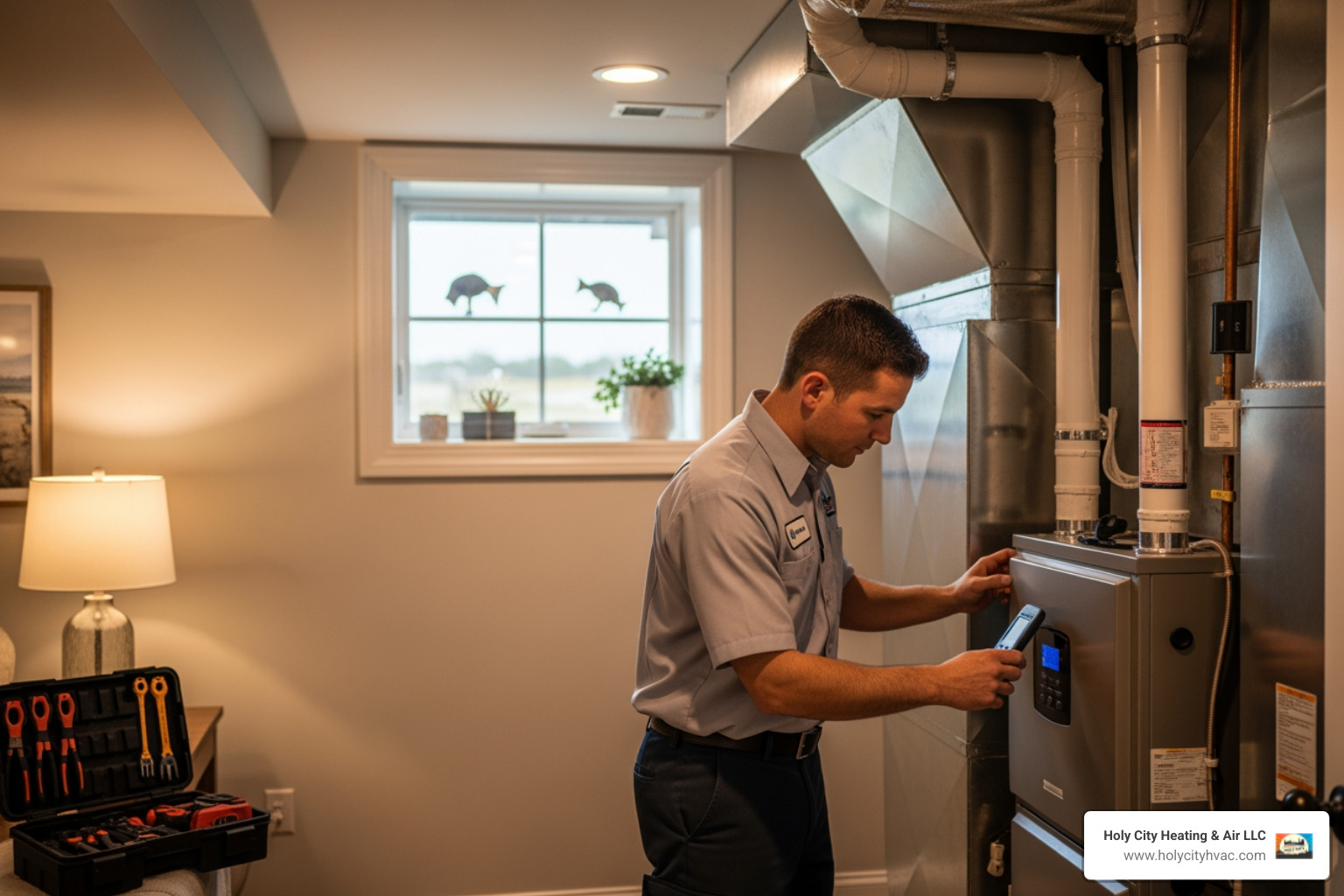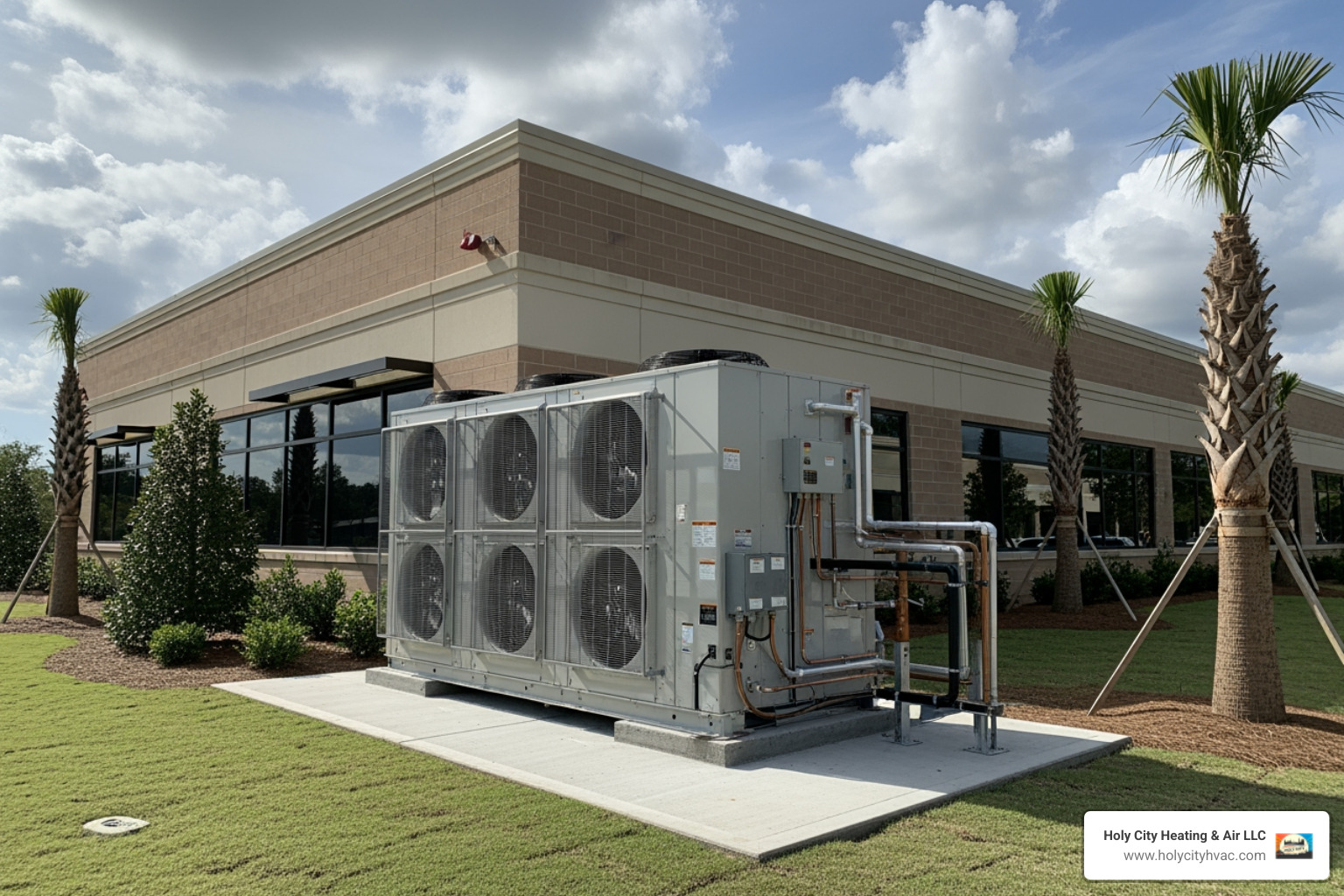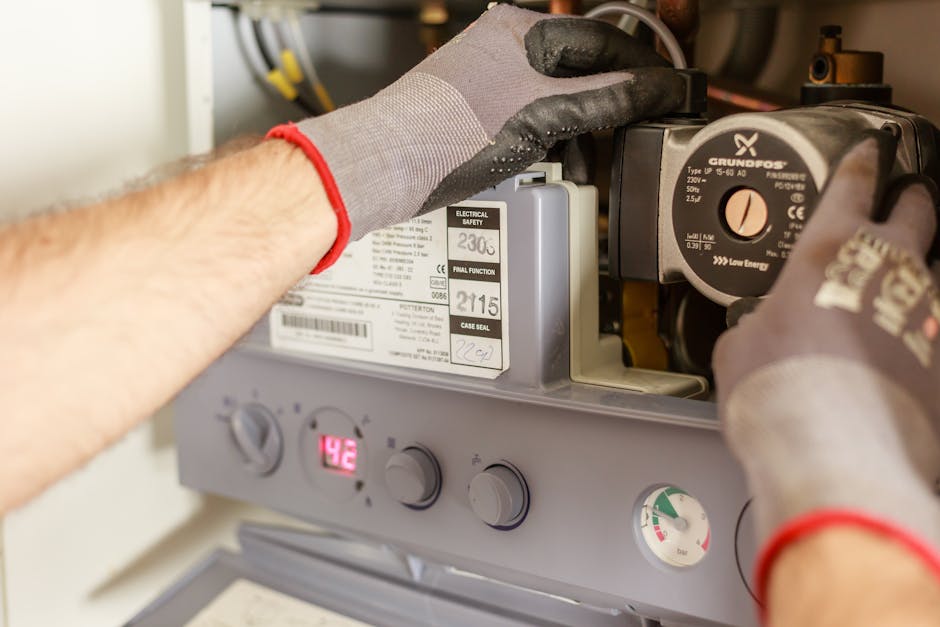
Why Understanding Gas Furnace Repair Bills Matters
When your gas heater repair cost becomes an unwelcome surprise on a cold Charleston morning, you're not alone. Most homeowners face repair bills ranging from simple fixes to major component replacements.
Quick Gas Heater Repair Cost Overview:
- Minor repairs: Flame sensor cleaning, thermostat issues, filter problems
- Moderate repairs: Ignitor replacement, blower motor issues, gas valve problems
- Major repairs: Heat exchanger replacement, control board failure, complete system overhaul
- Service fees: Diagnostic charges, labor rates, emergency premiums
- Key factors: Furnace age, part availability, repair complexity, time of service
Many Charleston residents feel overwhelmed when facing furnace repairs, wishing they understood what they were paying for before the bill arrived. The good news is that understanding what drives these expenses puts you in control.
Your furnace works hard to keep your family comfortable, but when critical components fail, knowing what to expect can save you from financial stress. Whether it's a minor flame sensor cleaning or a major heat exchanger replacement, each repair tells a story about your system's condition and your home's heating future.
What Drives Your Gas Heater Repair Cost?
When your furnace stops working on a chilly Charleston morning, your first thought is getting warm again. Your second is about the cost. We believe in helping you understand what goes into your gas heater repair cost.
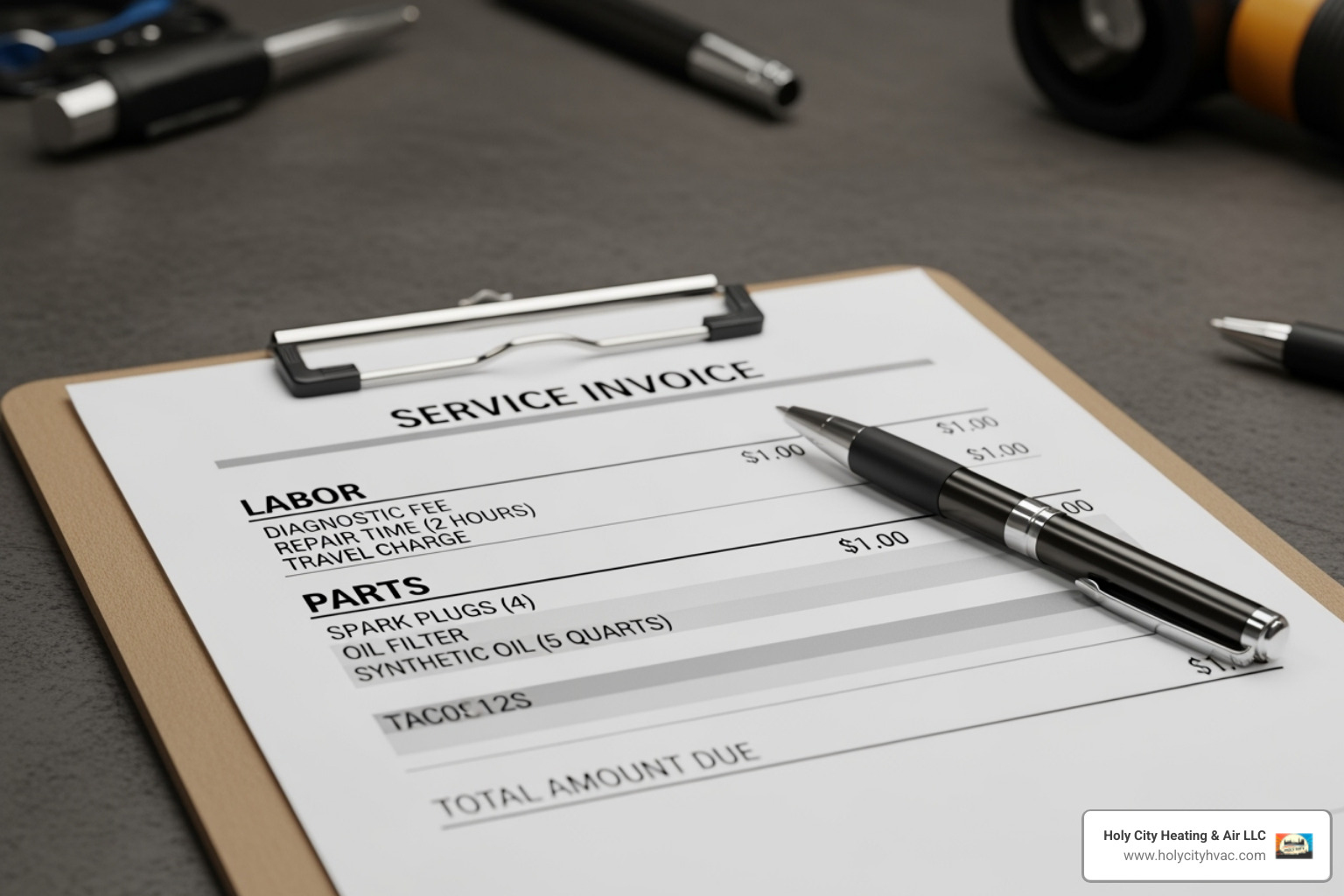
Think of your repair bill as a combination of key ingredients. The service call fee covers getting a certified technician to your home, from downtown Charleston to Kiawah Island, and includes the expertise to diagnose the problem. Labor rates reflect the skill required to safely work on complex gas systems, while parts costs vary depending on what needs replacing. A simple sensor is less of an investment than a new control board or blower motor.
Timing also impacts your gas heater repair cost. Emergency service premiums and after-hours fees apply when you need immediate service outside of a 9-to-5 schedule, like on a weekend or holiday.
Key Factors Influencing the Final Bill
Several behind-the-scenes factors also impact what you'll pay for furnace repairs.
- Furnace age and condition: Older or poorly maintained systems often have more complex and costly issues.
- Unit efficiency and complexity: High-efficiency systems may use sophisticated parts that require specialized knowledge to repair.
- Parts availability: Common parts stocked on our trucks lead to faster, more affordable repairs. Specialized parts may need to be ordered.
- Warranty coverage: If your system is under warranty, it can significantly reduce your out-of-pocket expense for parts. We work with comprehensive Daikin warranties and the Daikin Comfort Promise.
Understanding these factors helps you have more informed conversations with our technicians and makes repair decisions feel less overwhelming.
Common Furnace Problems & Their Repair Implications
It's a chilly Charleston evening, and your furnace is acting up—blowing cold air, making strange noises, or not turning on. Most furnace problems fall into predictable categories, which helps you know what to expect when our technicians arrive.
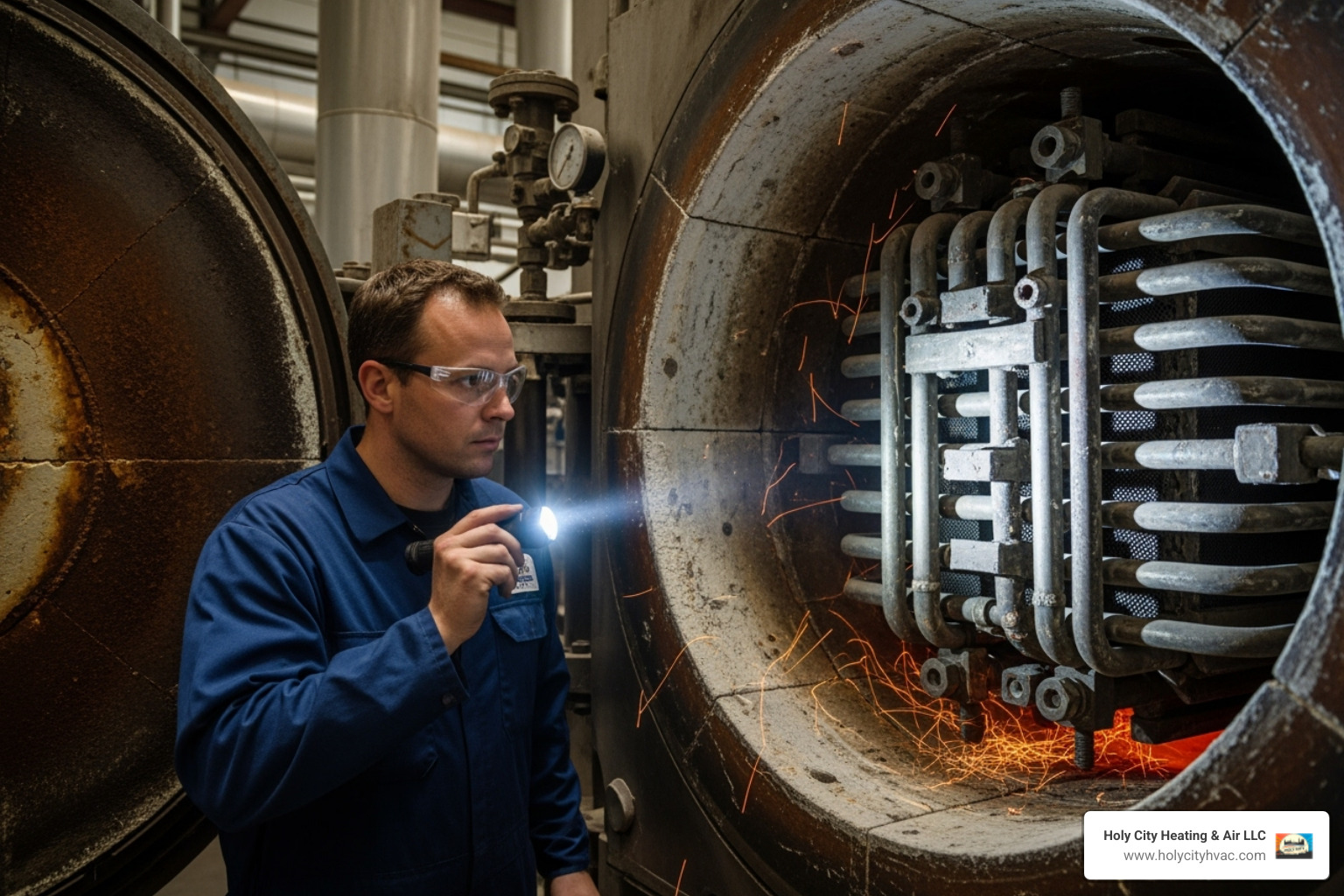
We categorize repairs based on complexity, which directly impacts your gas heater repair cost. Some are quick fixes, while others involve critical safety components requiring extensive work. With gas appliances, safety always comes first.
Understanding the Gas Heater Repair Cost for Minor Issues
Many common problems are straightforward to fix and stem from basic maintenance needs or small component failures.
- Clogged air filters: A dirty filter restricts airflow, causing the furnace to overheat and shut down. A simple filter replacement resolves this.
- Thermostat malfunctions: Issues can range from dead batteries to incorrect readings. Our technicians can diagnose and fix these quickly.
- Dirty flame sensor: Soot can cover this safety device, causing the furnace to shut off the gas supply. Cleaning the sensor restores normal operation.
- Failing ignitors: Modern furnaces use ignitors to light the gas. Replacing a failing one is a routine repair for our experienced technicians.
These issues are typically less complex, making them more manageable for your budget. Regular maintenance helps catch them early.
When Repairs Become More Significant
Some issues point to serious conditions that require more intensive work on critical components.
- Blower motor failure: The fan that circulates warm air has stopped working. Repairing or replacing this central component is a detailed job.
- Cracked heat exchanger: This is the most serious problem, as it can leak carbon monoxide into your home. Due to the severe safety risk, this almost always requires immediate attention and replacement.
- Gas valve problems: A malfunctioning valve can prevent the furnace from heating or create a safety hazard. This repair requires expert knowledge.
- Control board failure: The furnace's "brain" has gone offline. Replacing it involves complex electrical work and specialized parts.
When facing these significant repairs, our team explains the problem and discusses the best path forward for your Charleston area home.
The Critical Choice: Repairing vs. Replacing Your Furnace
Every homeowner eventually faces a tough question: "Should I keep fixing this old furnace, or is it time to replace it?" It's like deciding whether to keep pouring money into an aging car or trade it in for a newer, more reliable model.
When you're looking at another gas heater repair cost, it's easy to focus on the immediate expense. Our experience serving Charleston families since 2015 helps us guide you toward the bigger picture. Sometimes a repair makes sense, but other times it's a temporary fix for a larger problem.
| Criteria | Repair | Replace |
|---|---|---|
| Furnace Age | Generally for younger units (under 10-12 years) | Often for older units (15+ years) |
| Repair Complexity | Minor to moderate issues | Major component failures (e.g., heat exchanger) |
| Frequency of Breakdowns | Infrequent, isolated incidents | Frequent, recurring problems |
| Energy Efficiency | Maintains current efficiency (may be low) | Significant improvement with modern, high-AFUE units |
Making an Informed Decision
Most gas furnaces have a lifespan of 15 to 20 years. An older furnace may still work, but it likely isn't as efficient as it once was.
- The 50% Rule: A helpful guideline is to consider replacement if a repair's cost is approaching half the price of a new furnace, especially on an older system.
- Frequency of Repairs: If you're calling for service multiple times a winter, your furnace may be signaling that other components are nearing failure.
- Rising Energy Bills: An aging furnace works harder to heat your home, which shows up in your utility costs. Compare this year's bills to a few years ago.
- Inconsistent Heating: If some rooms are cold while others are hot, or the furnace can't maintain a set temperature, it's a sign of declining performance.
Modern high-efficiency furnaces offer lower monthly bills and the peace of mind that comes with fresh warranties. When you're ready to make this decision, our team provides an honest assessment. For additional guidance, you can check out these tips for hiring a qualified contractor.
Our goal is your family's comfort, whether through a precise repair or a seamless new installation.
How to Minimize Future Repair Bills
Nobody enjoys waiting for a repair technician, especially when a surprise gas heater repair cost hits your budget. The good news is that many expensive furnace problems are preventable with proper care.
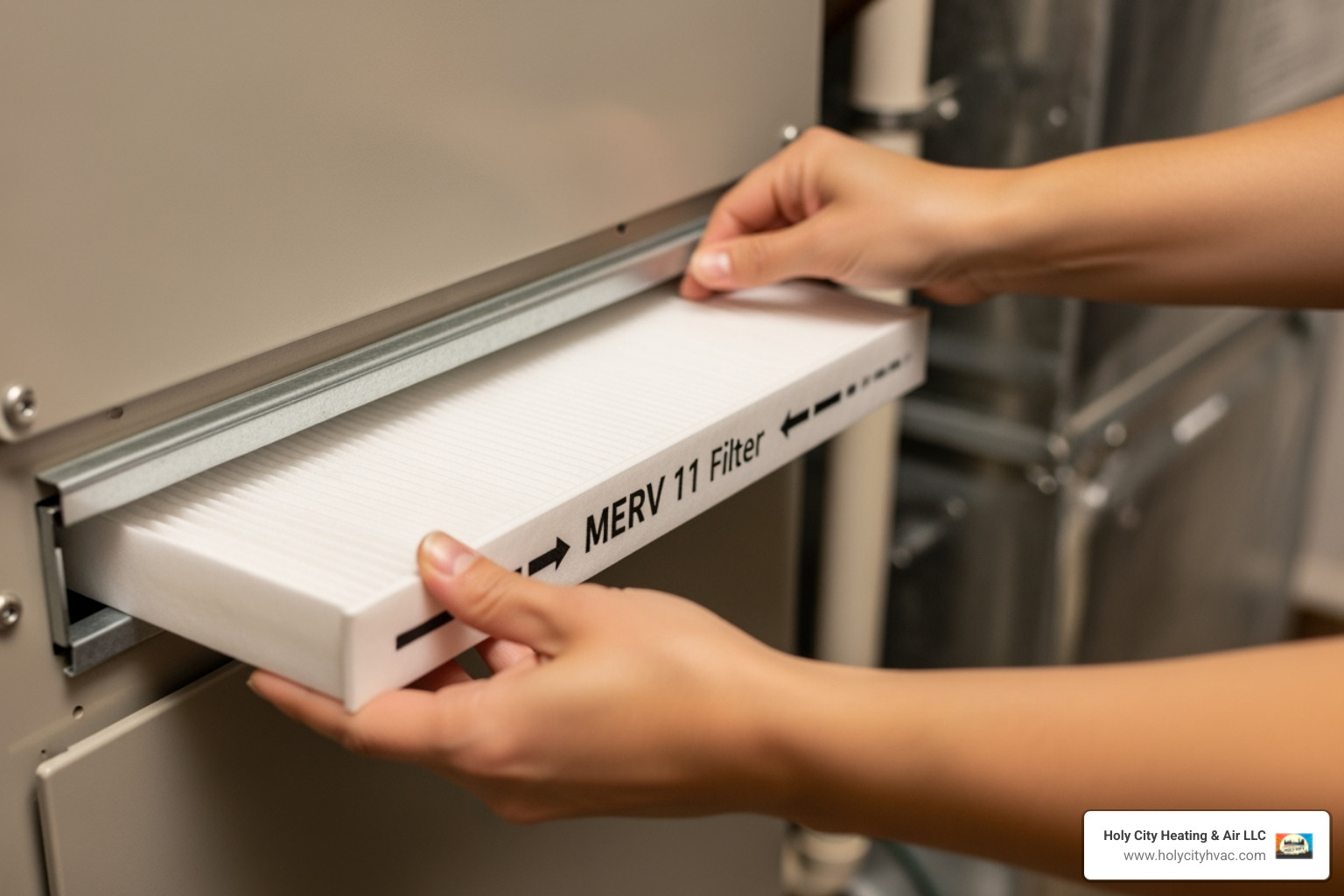
Think of your furnace like your car—ignore maintenance, and you'll eventually be stranded. Give it regular attention, and it will serve you faithfully.
The Value of Annual Professional Maintenance
Preventative tune-ups are like an insurance policy for your heating system. During these visits, our certified technicians hunt for trouble before it finds you. We clean burners, check electrical connections, lubricate moving parts, and perform critical safety inspections. We carefully examine the heat exchanger and conduct carbon monoxide checks because your family's safety is our top priority.
A well-maintained furnace operates with improved efficiency, which can lower energy bills and lead to an extended equipment life. Most importantly, annual maintenance allows us to catch small problems early, turning potential emergencies into routine fixes.
Simple DIY Steps to Lower Your Gas Heater Repair Cost
Between professional visits, you can take a few simple steps:
- Change filters every one to three months. This is the single most impactful thing you can do for your furnace's health.
- Check thermostat batteries. Before calling for service, try replacing the batteries.
- Keep vents and registers clear of furniture, toys, or other obstructions to ensure proper airflow.
- Check outdoor intake/exhaust pipes on high-efficiency units and clear any blockages from leaves or debris.
- Check the power switch and breaker. Sometimes a tripped breaker or an accidentally flipped switch is the only problem.
Combining these tasks with annual professional maintenance is the best defense against surprise breakdowns and high repair bills. For additional maintenance tips, the Energy Star maintenance checklist provides helpful guidance for homeowners.
Frequently Asked Questions about Gas Furnace Repairs
When your furnace acts up, it's natural to have questions. Here are answers to some of the most common ones we hear from Charleston families.
Why is my furnace blowing cold air?
This frustrating problem usually has a straightforward explanation, though the gas heater repair cost will depend on the cause.
- Clogged air filter: A severely dirty filter can cause the furnace to overheat and shut off the burners as a safety measure, while the fan continues to run.
- Ignitor or pilot light problems: If the ignitor fails or the pilot light is out, the burners won't light to produce heat.
- Thermostat troubles: Incorrect settings or a malfunction can cause the fan to run without activating the heat.
- Gas supply issues: A problem with the gas valve or supply line can prevent fuel from reaching the burners.
Before calling, check your thermostat settings and air filter. If those are fine, it's time to call Holy City Heating & Air.
Is it worth repairing a furnace that is over 15 years old?
When a furnace reaches the 15-year mark, you need to think strategically about repairs.
Consider the frequency and severity of recent repairs. If you're seeing our technicians often for major issues, replacement may be more cost-effective. Also, consider energy efficiency; a modern unit can significantly lower your monthly bills. Finally, safety is a key factor, as older components like the heat exchanger can develop risks over time.
We often refer to the 50% rule: if a repair costs close to half the price of a new system, replacement is usually the smarter long-term investment. Our technicians can provide an honest assessment to help you decide.
How long does a typical furnace repair take?
The repair duration depends on the problem's complexity.
- Simple fixes like cleaning a flame sensor or replacing a filter can often be done in an hour or two.
- Moderate repairs, such as replacing an ignitor, may take 2 to 4 hours.
- Major component replacements like a blower motor or control board can take several hours but are usually completed in a single day.
Our trucks are stocked with common parts to solve your problem on the first visit whenever possible. We'll always give you a realistic timeframe once we diagnose the issue.
Conclusion: Your Path to a Warm and Worry-Free Home
When your furnace fails on a chilly Charleston evening, understanding your gas heater repair cost empowers you to make informed decisions. We've covered the key factors influencing repair bills, from service call fees to the differences between minor issues and major problems involving critical components.
We also discussed the crucial choice between repairing an aging furnace and investing in a replacement. The 50% rule, along with your furnace's age, repair frequency, and efficiency, can guide your decision. The best way to minimize your gas heater repair cost is through proactive care. Annual professional maintenance, combined with simple DIY tasks like changing filters, is your best defense against expensive, unexpected breakdowns.
At Holy City Heating & Air, we've helped Charleston families stay warm since 2015, bringing over 20 years of industry expertise to every call. As a family-owned business, we understand your comfort is essential. Our EPA-certified, licensed professionals provide peace of mind, backed by comprehensive Daikin warranties and the Daikin Comfort Promise.
Whether you need an urgent repair in Mount Pleasant, routine maintenance in Summerville, or guidance on a replacement in Johns Island, we are here to help. We invest in our team to ensure you receive the best service, combining the resources of a growing company with the personal care of a local business.
For a professional and honest assessment of your heating system, consult certified experts who understand your community's needs. Learn more about our expert heating services and let us help you achieve the warm, worry-free home your family deserves.
Recent posts






